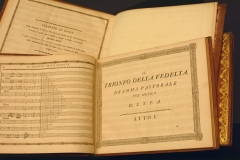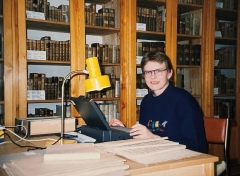The East German RISM Working Group Germany celebrates its 70th anniversary
Friday, November 14, 2025

70 years of the East German Working Group of the Répertoire International des Sources Musicales (RISM) – this means looking back on international understanding after the Second World War, on East-West German cooperation and reunification, and, last but not least, on 70 years of technical development.
RISM was founded after the Second World War, when people were faced with the ruins of war: numerous music sources had also been lost. One of the goals was to simply take stock and secure what remained, but above all, the aim was to systematically catalogue music sources on an international scale. In Germany, public funding, most recently as a long-term project of the Academy of Sciences and Literature in Mainz, made it possible to staff two offices. The fact that there are still two offices today is due to the division of Germany; the offices in Munich and Dresden were merged under one roof in 1991.
The history of the East German RISM office began in 1955 against the backdrop of the political division of Germany. At first, the Munich RISM group also wanted to record music sources from the GDR, but the GDR Ministry of Culture refused to cooperate – for reasons of state sovereignty. Instead, a separate working group was established in Berlin, which took on the task of cataloguing music sources in the East under the auspices of the German National Library. In the following decades, a research centre was established, which was closely linked to Humboldt University and later to the Berlin Music Department. In 1984, responsibility was finally transferred to the Saxon State Library in Dresden, giving RISM’s work in the GDR a new institutional home.
Despite the political tensions of the Cold War, cooperation between the West and East German RISM working groups remained remarkably constructive. As early as December 1955, staff from both sides met in Berlin for an initial discussion, during which the Munich group generously shared its findings to date with the newly founded GDR working group. It was agreed that the work on the collected prints would be centralised in Munich and reported from there to the RISM headquarters in Paris – a sign of scientific cooperation across political boundaries. In the following decades, both sides continued to exchange data and copies on a regular basis. Officially, however, political realities always had to be taken into account: publications referred to working groups in the FRG and the ‘SBZ’ (Soviet Occupation Zone), and from 1971 onwards, the catalogues were given separate country codes. Nevertheless, scientific cooperation remained lively – an example of how professional communities and researchers were able to build bridges even in times of division.

Since sources were not only taken from large music collections in central libraries, but also from small institutions such as church archives, the work involved a number of logistical challenges. In the early decades, the cataloguers travelled to the institutions personally, even to the most remote locations, in order to examine the sources on site. Cataloguing was done by hand, as computer systems did not yet exist at that time. The title entries were noted down by hand on index cards and transcribed in Berlin by a typist using a typewriter and distributed as carbon copies.
Technical progress continuously changed the work that had been going on for decades: after 1980, data was only merged into a central computer system, but soon the working groups were also able to switch to computer-based work. After the first catalogues had been published in book form, CD-ROM publications followed. In 2009, the online catalogue was finally launched, which not only enables direct cooperation between all workplaces, but also allows users free access to the data.
Current developments in text and music recognition, and above all the possibilities offered by AI, require a new approach to cataloguing in RISM. For this reason, the German RISM working group has organised a conference on 13 and 14 November 2025 at the SLUB Dresden on the topic of ‘Music prints in the digital transformation: perspectives on their documentation, representation and networking’.
Share Tweet EmailCategory: New at RISM


